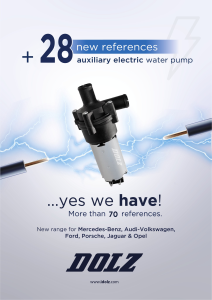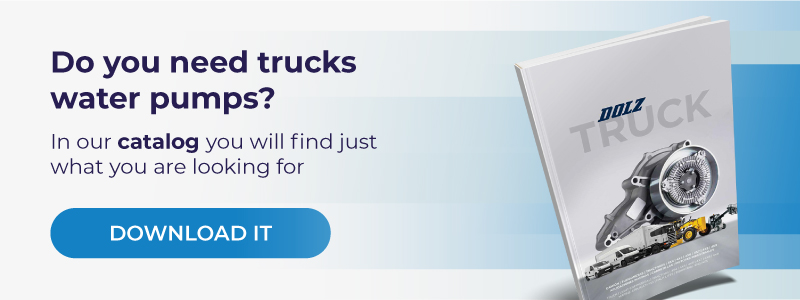Cooling systems have become more and more complex as vehicle manufacturers continue to improve car comfort and performance. Therefore, secondary water pumps are becoming increasingly essential for the optimal functioning of modern cooling systems, both in combustion engines and in hybrid and electric vehicles.
Main uses and functions of secondary water pumps in vehicles
Secondary water pumps, also known as auxiliary pumps, are the star component in upsetting any vehicle’s cooling system. Even though not all vehicles have one (yet), these pumps are growingly popular as engines become more efficient and generate less excess heat.
This type of pump is not connected to the main engine cooling system, so it is not running all the time. Instead, it provides supplementary coolant that circulates through a bypass hose to the heater core when needed. And it guarantees the cooling of the electric motor, and the inverter that electric and hybrid vehicles have.
Secondary water pumps keep the coolant flowing even when the engine is not running, ensuring there is always enough volume of coolant to keep the heater core warm. This enables vehicle engineers to use larger heater cores, allowing for the following features:
Improve driver comfort
Some types of engines, such as diesel-power ones, do not generate great amounts of heat when running or idling. This means that in lower engine speeds, the coolant in the heater core might lose its heat before being passed through the outlet. Adding a secondary coolant pump secures optimum heating even at low speeds.
This is important for passenger comfort, since it allows for sufficient heating even when passengers are driving in traffic or at low RPM. Moreover, an auxiliary water pump can also keep the cabin heated for short periods of time, even after the driver has turned off the ignition.
Maintain battery temperature
Thermal management poses a singular challenge in fully or partially battery-powered vehicles. Modern vehicles with hybrid drive and stop/start systems use batteries that must be kept at a certain operating temperature to remain efficient in the long term. This is where auxiliary pumps come into play, for example to cool down the turbocharge.
The intelligent thermal management in these vehicles relies on several auxiliary pumps, which are turned on by the ECU when needed for a more targeted cooling. These pumps are individually adjustable; each of them is responsible for cooling a different area and can fail or be replaced without affecting the others.
Related content: When and how to install an auxiliary electric water pump
Signs and causes of failure in the secondary water pump
The main reasons why a secondary water pump fails are:
- Fluctuating heating performance
- Buzzing sound under the dashboard
- Age and wear
- Overheating
- Low or bad coolant
- Defective pump or improper installation
Keep reading to know more in depth about them:
1. Fluctuating heating performance
If the secondary water pump in a vehicle is inoperative, it will most probably lead to reduced or fluctuating heater performance at low speeds and at idle. This might also affect window fog, resulting in the defrost mode not working.
2. Buzzing sound under the dashboard
If there is an electrical problem with the secondary coolant pump, the pump might run faster than it should or continue to run after the engine is turned off. This will occasionally result in a high-pitched buzzing sound.
The sound indicates an electrical short in the wiring that powers the auxiliary water pump and is a key indicator of a need for replacement.
3. Age and wear
Like all moving and rotating components, brushes wear and windings short. The most common cause of water pump failure is simply from age and wear of its electric motor. Over time, most parts in a car or truck, auxiliary pumps included, start to break down due to constant wear and tear.
4. Overheating
Overheating issues might affect any water pump’s lifespan. Too much heat in the engine can cause problems with the coolant system. Overheating can hasten the auxiliary water pump’s failure because increased cooling system pressures can force coolant past the shaft seals.
5. Low or bad coolant
Low coolant can cause a pump to fail. If too little coolant is circulating through the circuit, the blower fan will pull enough heat out of the coolant and cause the heater core to get cold. Furthermore, if the fluid in the cooling system is not properly maintained or if it is mixed with improper fluids such as water, corrosion will occur, reducing pump efficiency.
6. Defective pump or improper installation
A defective or improperly installed auxiliary pump will, at some early point, start showing the malfunctioning symptoms outlined in the previous section. Investing in a quality and compatible brand, as well as paying attention to all individual specifications of assembly will ensure the correct functioning of the vehicle’s cooling system.
You may like: Peculiarities of an auxiliary water pump
Guaranteed auxiliary water pumps with a trusted supplier
Industrias Dolz, with almost 90 years of history, is a leader in the manufacture of water pumps. From mechanical and electrical water pumps to variable and auxiliary water pumps.
Currently our range of auxiliary electric water pumps offers more than 70 references, all of them now available, which allows us to cover most of the current fleet of vehicles, fully covering the needs and demands of our customers and allows us to continue expanding our range of products.

This year we launched 28 new references of our auxiliary electric water pumps.
The new secondary water pump references cover the demands of more than 850 vehicle models from brands such as Mercedes-Benz, Audi, BMW, Ford, Porsche, Jaguar, or Opel.
If you want to know more about them, check this post!
And if you are looking for top-tier auxiliary electric water pumps, contact us and we will provide you with the information and support you need.
…yes we have!


